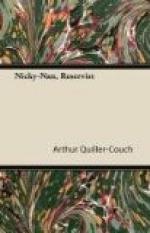“‘Tisn’ a ‘’oo,’ ’tis an ‘it’: bein’ an expression I got off an Extension Lecturer they had down to Bodmin, one time. I’d a great hankerin’, in those days, to measure six foot two in my socks afore I finished growin’, and I signed on for his lectures in that hope. With a man callin’ his-self by that name and advertisin’ as he’d lecture on ‘Measure for Measure,’ I thought I’d a little bit of all right. But he ran right off the rails an’ chatted away about the rummiest things, such as theatricals. I forget what switched ’en off an’ on to that partic’lar line: but I well remember his openin’ remark. He said, ’To measure the true stature of a great man we must go down to the true roots. A certain Jane is bound to overtake us if we dig too long among the common ’taturs with their un-stopp’d lines an’ weak endings and this or that defective early quest. Oh! all profitable, no doubt, an’ worth cultivatin’ so long as we do not look for taste.’ When I woke up at the end ’twas with these words printed in mind same as they’ve remained. But I couldn’ figure out how this here Jane got mixed up in the diet. So, bein’ of a practical mind then, in my ’teens, same as I be to-day, I stopped behind and asked him—takin’ care to look bright and intelligent—who might be this Jane he’d allooded to. If you’ll believe me, it turned out to be no person at all, but a way the gentry have of sayin’ they’re uncomfortable; same as, through some writin’ chap or other, all the papers was talkin’ of your belly as your Little Mary.”
“Mine?”
“When I say ‘yours,’ o’ course I mean to say ’ours’—that’s to say, every one’s.” Rat-it-all made a semicircular sweep of the hand in front of his person.
“Something of a liberty, I should say, however many you include. What I object to in these newspapers is the publicity. . . . But, if you ask my opinion, that Extension fellow made a start with pullin’ your leg.”
“You’re wrong, then. For I tried the expression ’pon Parson Steele only two days ago. ‘This here war, sir,’ I took occasion to say, ‘fairly gives me the Jane.’ He reckernised the word at once, an’ lugged out his note-book. ‘Do you know, constable,’ says he, ‘that you’re talkin’ French, an’ it’s highly interestin’?’ ’I make no doubt as ‘twould be, sir,’ says I, ’if I was to hold on with it.’ ‘You don’t understand,’ says he. ‘These Gallic turns o’ speech’—which, ‘tween you an’ me, I’d always thought o’ Gallic as a kind of acid—’these Gallic turns o’ speech,’ says he, ‘be engagin’ the attention of learned men to such an extent that I think o’ writin’ a paper upon ’em myself,’ says he, ’for the Royal Institution o’ Cornwall at their next Summer Meetin’.’ . . . I was considerably flattered, as you may well understand. . . . But that brings me back to my point. Parsons an’ constables, as I see the matter, be men set apart, an’ lonely. So when I reads ’pon the paper that this here war has made us all brothers, it strikes HOME, an’ I feel inclined to stop an’ pass the time o’ day with anybody. I don’t care who he may be.”




